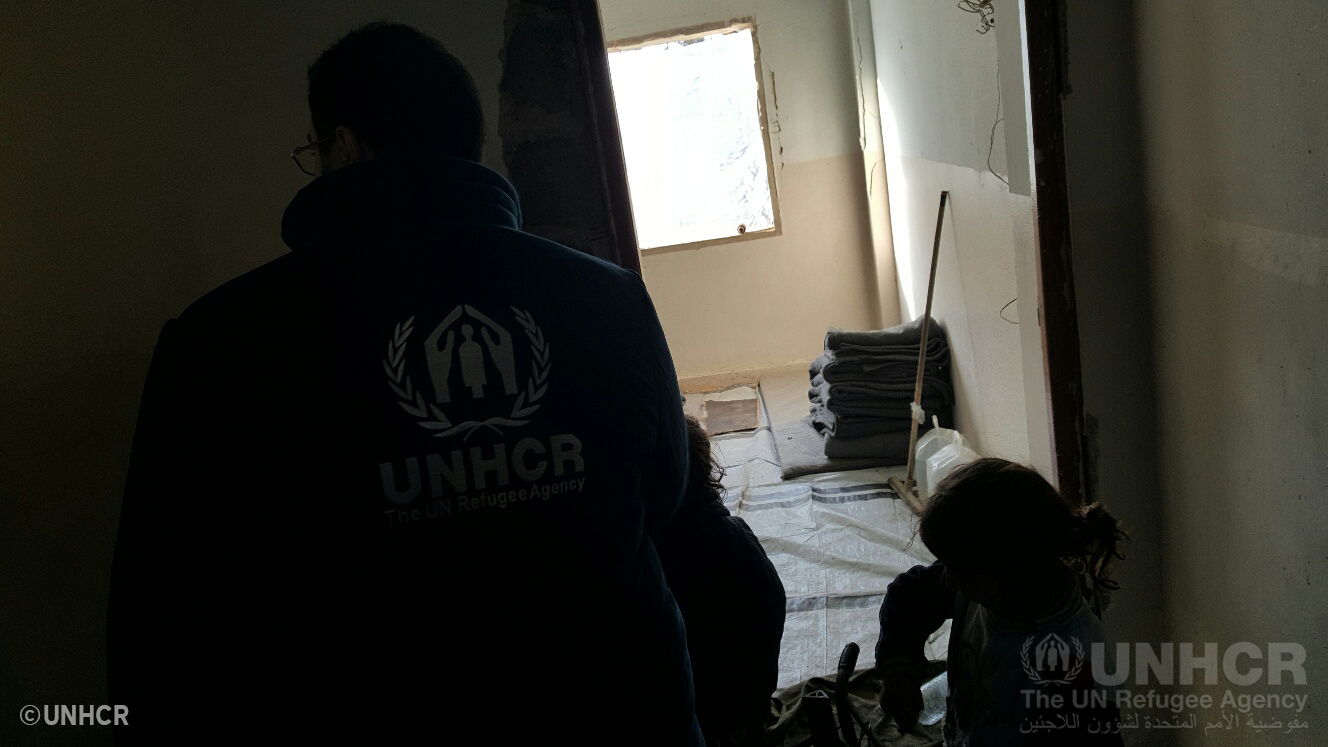As fighting continues over 31,000 Syrians are now displaced – with many fleeing and looking for refuge.
UNHCR, alongside other humanitarian agencies in Aleppo, is delivering a comprehensive response to meet the needs of the newly displaced from the Eastern part of Aleppo. IDPs interviewed by the UN describe a catastrophic humanitarian situation in the remaining neighborhoods of East Aleppo, with increased food scarcity translating into further price increases. At least 400 critically wounded or sick people require immediate evacuation from besieged areas of Eastern Aleppo. Humanitarian actors are delivering a comprehensive response to the needs of the newly displaced in all areas they can access, and stand ready to assist civilians in besieged east Aleppo whenever access will be granted.
As fighting continues in the ancient city of Aleppo, over 31, 000 Syrians are now displaced within the city.
Many residents of the eastern parts of Aleppo have fled and are now seeking refuge in neighboring areas, such as the Jibreen industrial area – where 18, 000 people are now displaced. A further 5,000 people have sought refuge in Sheikh Maqsoud – a Kurdish-controlled district, while others still have been luckier – reunited with family and loved ones in other parts of the city.

Many of those who have fled eastern districts are now in unfinished or partly-destroyed buildings. Syria, Aleppo. ©UNHCR/UNHCR
Heavy rainfall and leaking water did not stop hundreds of families from seeking shelter in an abandoned cotton factory – Mahalej – also in the Jibreen industrial area of southern Aleppo. UNHCR and its partners are providing vital humanitarian assistance to the thousands of people displaced here.
Winter is harsh in Syria – temperatures often drop below zero centigrade in many parts of the country, especially between the months of December to February. UNHCR, through its winter plan, has distributed shelter kits, winter clothes and high thermal blankets to most of the displaced population.

As winter approached and temperature drops, winter assistance make a big difference for displaced people in Aleppo. ©UNHCR/UNHCR
Plans are underway to distribute more clothes and winter boots, and to rehabilitate shelters which are damaged or offer little protection against the elements. UNHCR and partners are also providing other protection services, such as psychosocial support to traumatized children, legal aid and counseling, education and medical services through a network of 13 community centers in Aleppo. The UN, and local partners have provided hot meals and food, high thermal blankets, winter clothes, rugs and mattresses to ensure that all the families are well protected from the elements and are kept warm.

We are working to quickly provide shelter for people in an area where buildings have suffered extensive destruction. ©UNHCR/UNHCR
Many civilians in eastern Aleppo face an agonizing decision over whether to stay and risk being caught in the cross-fire, or take their chances and try to flee to refuge. A UNHCR staff member on the ground spoke to Mamoun – a 38-year-old man who left east Aleppo with his wife and two daughters in the middle of the night. He described a dangerous journey – one where he and his family were running for their lives. Mamoun was separated from his father and other family members along the way – he does not know whether his parents made it out.
“ at first we could easily obtain bread and rice, they were in abundance, but suddenly there was nothing.”
He described life in besieged eastern Aleppo over the past few weeks, saying “ at first we could easily obtain bread and rice, they were in abundance, but suddenly there was nothing. Prices of food items went soaring and we couldn’t afford to buy any food anymore.” He said that when they finally made it to Jibreen, UN agencies took care of them – supplying food, water, shelter, nutrition and health care, ”the only thing that missing, was a shower”, he added.
The UN and partners are scaling up their humanitarian response in Aleppo and responding to the needs of the newly displaced with shelter, food, nutrition, water and health assistance. UNHCR, as the leader of the shelter response, is providing emergency solutions as well as upgrading and rehabilitating shelters to provide new arrivals – like Mahmoud and his family – with some of the basics they need to stay warm, dry and fed.
Share on Facebook Share on Twitter